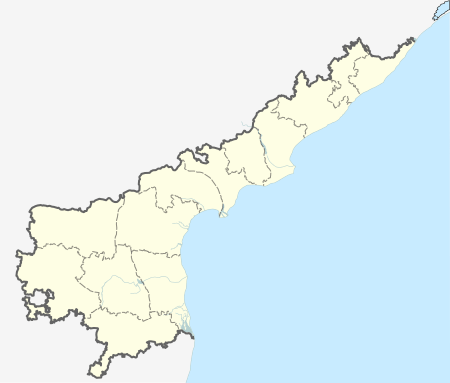Duggirala mandal
| Duggirala mandal దుగ్గిరాల మండలం | |
|---|---|
| Mandal | |
|
Mandal map of Guntur district showing Duggirala mandal (in green) | |
 Duggirala mandal Location in Andhra Pradesh, India | |
| Coordinates: 16°19′40″N 80°37′27″E / 16.32778°N 80.62417°ECoordinates: 16°19′40″N 80°37′27″E / 16.32778°N 80.62417°E | |
| Country | India |
| State | Andhra Pradesh |
| District | Guntur |
| Headquarters | Duggirala |
| Government | |
| • Body | Mandal Parishad |
| • Tehsildar | M.Sirisha |
| Population (2011)[1] | |
| • Total | 62,655 |
| Languages | |
| • Official | Telugu |
| Time zone | IST (UTC+5:30) |
Duggirala mandal is one of the 57 mandals in Guntur district of the Indian state of Andhra Pradesh. It is under the administration of Tenali revenue division and the headquarters are located at Duggirala.[2] The mandal is bounded by Mangalagiri, Pedakakani, Tenali and Kollipara mandals. Krishna River lies to the northeast of the Duggirala mandal.[3]
Demographics
As of 2011 census, the mandal had a population of 62,655. The total population constitute, 31,269 males and 31,386 females —a sex ratio of 1004 females per 1000 males. 5,947 children are in the age group of 0–6 years, of which 2,999 are boys and 2,948 are girls. The average literacy rate stands at 70.97% with 40,244 literates.[1]
Administration
The mandal is under the control of a tahsildar and the present tahsildar is M.Sirisha.[4] It also forms a part of the Andhra Pradesh Capital Region under the jurisdiction of APCRDA.[5] Duggirala mandal is one of the 3 mandals under Mangalagiri (Assembly constituency), which in turn represents Guntur (Lok Sabha constituency) of Andhra Pradesh.[6]
Towns and villages
As of 2011 census, the mandal has 14 villages and no towns.[2] Duggirala is the most populated and Devarapalle Agraharam is the least populated villages in the mandal.[7]
The settlements in the mandal are listed below:
- Chiluvur
- Chinapalem
- Chintalapudi
- Devarapalle Agraharam
- Duggirala(†)
- Emani
- Godavarru
- Kantamraju Konduru
- Morampudi
- Pedakondur
- Penumuli
- Perakalapudi
- Srungarapuram
- Tummapudi
Note: (†)-Mandal headquarters
Education
The mandal plays a major role in education for the rural students of the nearby villages.The primary and secondary school education is imparted by government, aided and private schools, under the School Education Department of the state.[8] As per the school information report for the academic year 2015–16, the mandal has more than 7,480 students enrolled in over 72 schools.[9][10]
See also
References
- 1 2 "Census 2011". The Registrar General & Census Commissioner, India. Retrieved 9 August 2014.
- 1 2 "Guntur District Mandals" (PDF). Census of India. pp. 85,110. Retrieved 11 February 20. Check date values in:
|access-date=(help) - ↑ "Mandals in Guntur district". aponline.gov.in. Retrieved 9 August 2014.
- ↑ "List of Tahsildars working in Guntur District as on 19.06.2014" (PDF). Guntur District Official Website. National Informatics Centre. p. 2. Retrieved 8 September 2014.
- ↑ "District wise mandals and villages covered in Krishna and Guntur districts" (PDF). Andhra Pradesh Capital Region Development Authority. Government of Andhra Pradesh. Retrieved 23 September 2015.
- ↑ "Delimitation of Parliamentary and Assembly Constituencies Order, 2008" (pdf). Election Commission of India. p. 22. Retrieved 11 October 2014.
- ↑ "Sub-District Details of Guntur District". The Registrar General & Census Commissioner, India. Retrieved 9 August 2014.
- ↑ "School Education Department" (PDF). School Education Department, Government of Andhra Pradesh. Retrieved 7 November 2016.
- ↑ "R1.1 SCHOOL INFORMATION".
- ↑ "Student Information Report". Commissionerate of School Education. Child info 2015-16, District School Education - Andhra Pradesh. Retrieved 8 November 2016.
 |
Mangalagiri mandal | Mangalagiri mandal | Krishna River |  |
| Pedakakani mandal | |
Kollipara mandal | ||
| ||||
| | ||||
| Tenali mandal | Tenali mandal | Kollipara mandal |
